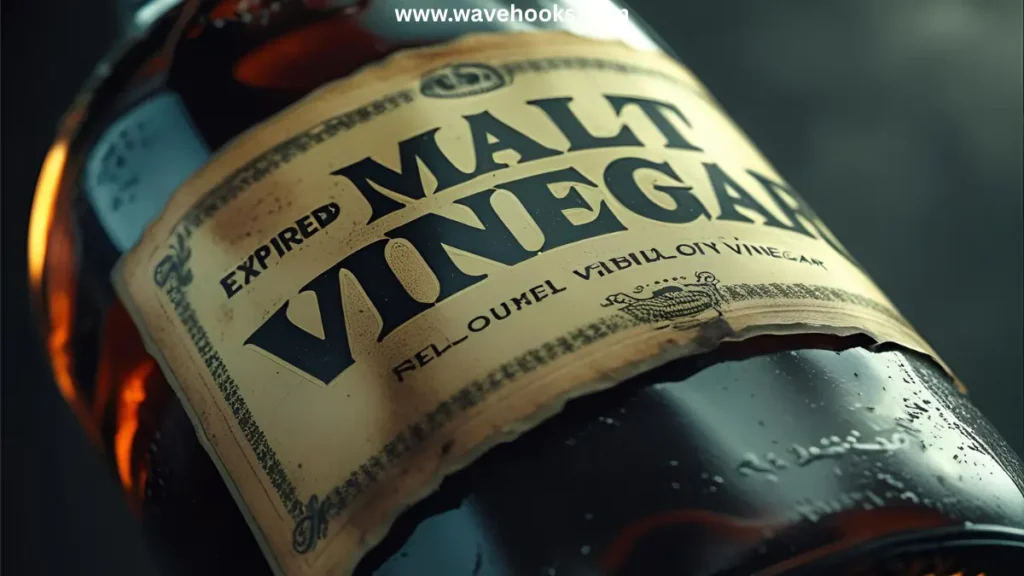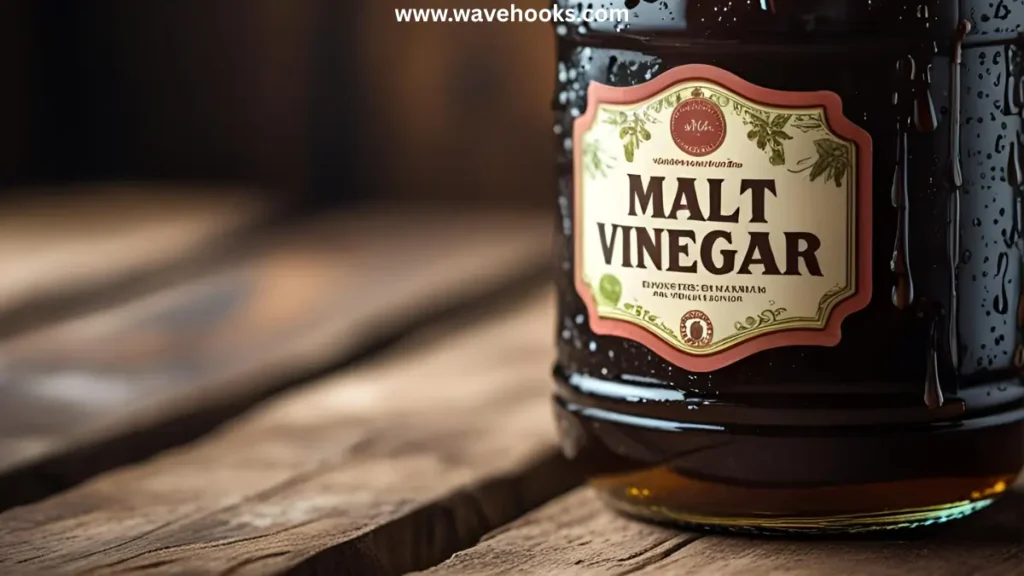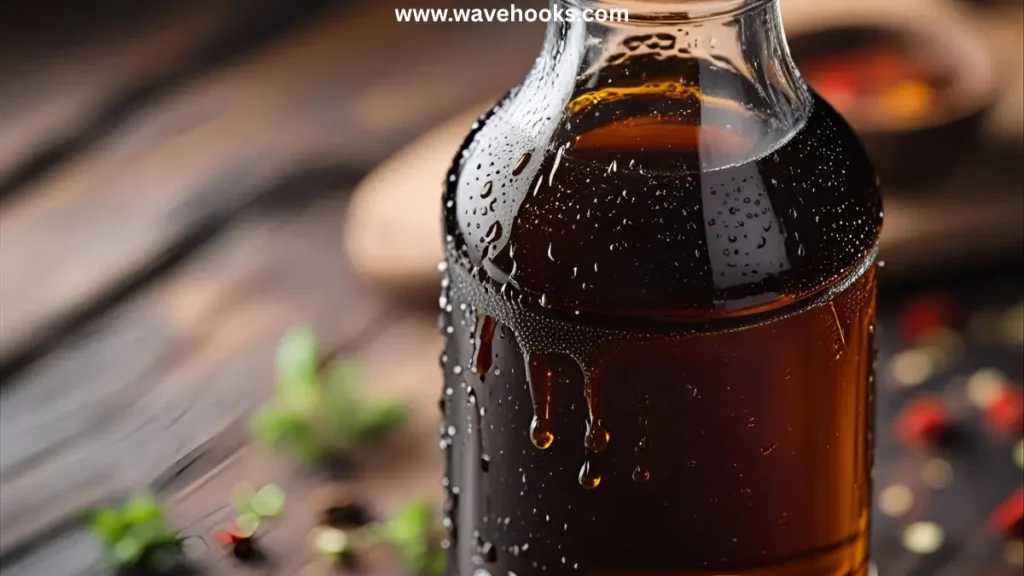Does malt vinegar go bad? That’s what I asked myself one Saturday while clearing out a kitchen cabinet.
I found an old, dusty bottle, sealed but aged. I worried. Should I toss it? Taste it? I needed answers.
That moment sparked a deep dive into everything vinegar: shelf life, spoilage signs, and storage tips.
Here’s the full story, from one kitchen to another, to know whether the malt vinegar goes bad or not!
What is malt vinegar?

Before we jump into how long it lasts, let’s clear something up: What is malt vinegar? And where is it used?
I once thought all vinegars were the same until I tried malt vinegar splashed over some classic fish and chips.
That rich, tangy flavour changed my mind. This isn’t your white vinegar or apple cider variety.
It’s made from fermented barley. It is sweet, nutty, tangy, and brown.
Where It’s Commonly Used
Malt vinegar has its little corner in the kitchen. It is commonly used in:
- Over fries or onion rings, especially for British-style recipes.
- In homemade chutneys or rich marinades.
- For pickling red onions or crunchy cucumbers.
- Stirred into salad dressings when you want a flavourful taste.
It’s not meant for baking or cleaning surfaces; it’s made for food that needs essence.
Suggested Read: Why Does Malt Vinegar Smell Bad? Unmasking The Hidden Cause!
Does Malt Vinegar Go Bad?

Malt vinegar is acidic, which means it naturally keeps bacteria away. It doesn’t spoil like milk or go mouldy overnight.
But over time, it can lose its flavour or change in texture.
It becomes flat. Less punchy. And sometimes a little funky—but not always in a bad way.
What I’ve Noticed:
- The flavour gets noticeably dull after a few years.
- Sometimes, they develop harmless, cloudy, stringy bits.
- If left open or exposed to heat, it can turn from sharp to syrupy.
Does Malt Vinegar Go Bad If Opened?
Only if you treat it wrong. I’ve had open bottles that lasted years because I followed a few golden rules.
Here’s what I’ve learnt:
- Always keep the cap sealed tight—air is vinegar’s slow enemy.
- Never leave the bottle open near the stove, the heat speeds up flavour loss.
- Don’t use dirty spoons or pour back leftover vinegar—it can introduce contaminants.
Just like with olive oil or honey, little bad habits add up over time. But if you care for it, an open bottle can hold its own for ages.
Does Malt Vinegar Go Bad If Not Refrigerated?
No, it’s better even if it is outside the fridge. It doesn’t spoil, but cold can change its character.
The flavour can flatten, and some sediment may appear faster.
Here’s Why:
- Cold slows bacteria, but vinegar already does that on its own.
- Fridge moisture might alter taste faster.
- It stores better in a cool, dark cabinet.
- You won’t get sick, but you might lose flavour.
Suggested Read: Does Rice Vinegar Go Bad If Not Refrigerated Overnight?
How Long Does Vinegar Last Once Opened?

Generally? Two to three years for the best flavour. But if stored well, it can last much longer.
Follow these simple tips:
- Write the open date with tape.
- Replace every 3 years for full flavour.
- Use older bottles for pickling or marinades
- Safety-wise, it’s good for the long term. Taste-wise? It fades gently over time.
Can You Use Malt Vinegar After the Expiration Date?
Yes, you can use it. The date is about flavor and quality, not safety.
Here is what I do before using an expired bottle:
- Check the smell; if it smells sharp and clean, it’s good.
- Do a small taste test
- If it’s not funky, use it in cooked recipes.
- If it’s bland or bitter? Use it for cleaning duties or compost.
Suggested Read: Will Vinegar Kill Grass? 10 Shocking Results Revealed Now!
How to Tell If Malt Vinegar Is Bad

Use your senses, vinegar rarely goes bad, but here’s what I check:
Here’s my simple checklist:
Smell: If it’s musty or rotten, toss it.
Appearance: if it’s mold, no-go. If it looks cloudy, you can use.
Taste: Metallic or weird? Time to replace
Cap area: If it’s sticky or crusty, clean it fast
I treat it like wine; if it feels wrong, I don’t risk it.
Best Storage Tips for Malt Vinegar
These are the exact steps I follow now after losing a couple of good bottles to bad storage.
My Must-Follow Rules:
Simple habits, but they work.
- Store in a dark cabinet, not near heat.
- Keep the cap sealed tightly.
- Never pour back leftover vinegar.
- Use clean spoons to scoop.
- Label when opened
Mistakes to Avoid When Storing Vinegar

Mistakes to avoid when storing vinegar? Oh, I’ve made plenty. Here’s what not to do:
Don’t Do This:
Small mistakes can shorten its life or ruin the flavor
- Leaving the cap loose.
- Storing it in the oven or microwave.
- Using fingers or dirty spoons to taste.
- Refrigerating it out of habit.
- Tossing it just because it’s cloudy.
Suggested Read: How To Prepare DIY Vinegar Cleaning Spray: The Ideal Solution
How to Extend the Shelf Life of Malt Vinegar
How to extend the shelf life of malt vinegar? It’s easier than you’d think.
I follow these tips:
This is how I make one bottle last longer without losing flavor.
- Always close the cap tightly.
- Store in a cool, dry cabinet.
- Avoid plastic bottles for long-term use.
- Don’t let air, heat, or light in.
- Label your bottles by date opened.
Final Thoughts: Does malt vinegar go bad

Malt vinegar rarely becomes unsafe, but its taste and quality can fade over time, especially if you don’t store it properly.
For me, a little care goes a long way. I’ve used vinegar years past the date, and honestly? Most of the time, it’s just fine.
Don’t fear the “mother”, and don’t toss good vinegar unless it truly smells or tastes off.
Trust your senses and don’t waste what doesn’t need wasting.
Suggested Read:
Can I Add Vinegar To My Laundry For A Fresh Smell? Must Read








One Comment